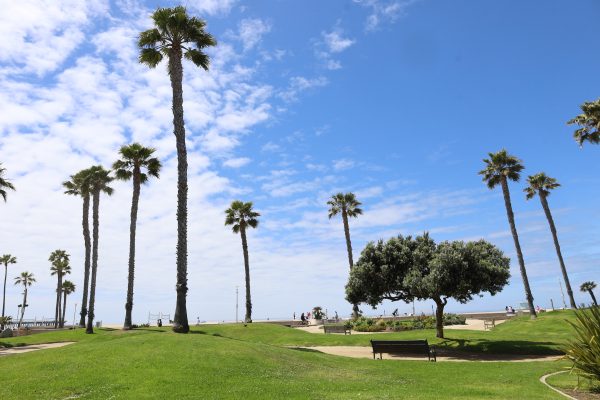
Once again, Hermosa activist Jim Lissner has altered the political landscape by appealing to Hermosa Beach voters directly.
In 2007 Hermosa Beach City Council passed an ordinance to ease the expansion of some Hermosa nightspots. Lissner, a longtime advocate of limiting alcohol-serving establishments, responded by going to Hermosa voters and getting enough signatures to place a referendum on the ballot aimed at overturning the city ordinance. With the judgment of the ballot box looming, the council blinked, rescinding its own ordinance without waiting to see whether the voters would do it for them.
On Tuesday, another looming ballot measure by Lissner had a strong, if not decisive, hand in the direction taken by a city committee studying the possibility of increasing the license taxes paid by Hermosa businesses for the first time in 19 years.
The committee, which includes low-tax proponents, agreed to propose a ballot measure to increase the city’s business license taxes – primarily out of concern that Lissner’s measure, which has already qualified for a spot on the November ballot, will raise taxes much, much more.
The city committee, which includes Mayor Pete Tucker, Councilman Kit Bobko and a number of business people, will present its proposal at a Town Hall meeting 6 p.m. Monday, June 20 at City Hall. If the measure survives the public vetting, it could be placed before the City Council, where a four-fifths majority would be required to place it alongside Lissner’s on the ballot.
If two competing tax-increase measures appear on the same ballot, the one that gets the most votes would win, unless both measures lose.
Bobko, who once said he would vote against any tax increase that might be suggested by the committee, told his committee colleagues on Tuesday that they must propose a tax increase, because the one backed by Lissner “would be much worse than this – much worse than this.”
Double or bust
Lissner’s ballot initiative would impose steep increases in the business license tax for nightspots that serve liquor, stay open late and are clustered near similar establishments. It could balloon the tax from $2,268 a year to more than $100,000 a year for many nightspots on the popular Pier Plaza.
The committee’s proposal could raise taxes for a broad range of businesses, with an emphasis on nightspots. Ron Newman, co-owner of Sharkeez restaurant on the Pier Plaza and a vigorous opponent of the Lissner initiative, told the committee that he would not stand in the way of a proposal that would double his business license tax, which is now about $2,400 a year.
In a previous email, sent by Newman to numerous businesspeople the week before, he had gone somewhat further.
“Attention everyone! We are going to go with a 200 percent increase on your business license. If you are paying $2,000 a year it will go to $6,000 or $8,000 depending on the add-on’s [for factors such as late hours],” Newman wrote. “Lissner’s proposal, which will go to the voters, will cost most of us over $100,000 a year,” he wrote. “…Lissner has the 500 people that signed the referendum so it will go to the voters. We want to cooperate with the city so they will support our proposal.”
Cha-ching
Lissner has said his proposal would make the nightspots cover the city’s cost of policing the downtown area on weekends. At the committee’s behest, city Finance Director Viki Copeland prepared an estimate of the cost of policing the Pier Plaza, in the heart of the downtown nightlife, which came in at $497,568 a year.
That’s the cost of one police sergeant and one officer assigned fulltime to the Plaza Thursday through Saturday, plus overtime pay for officers or sergeants assigned to the Plaza eight hours a day Friday through Sunday.
The city’s proposed budget for the upcoming year has a $27 million general fund, balanced in part by permanently eliminating 17 employee positions through attrition and 11 early retirement deals.
Lissner told the committee that the downtown policing cost, figuring in non-salary overhead, would be more like $1.5 million, not counting the cost of prosecuting assaults, DUI and other crimes.
“That would be insane salaries, so obviously you’re doing something wrong with the math,” responded committee member Andrea Jacobsson, of Jama Auto House on Pacific Coast Highway.
In an interview, Newman also said Lissner’s figure was inflated.
And he said Lissner’s position doesn’t take into account money the city realizes from the nightspots in sales tax, parking tickets and the attraction of travelers to nearby hotels. Newman said an estimate of the city’s nightlife-related income was being prepared for the Town Hall.
“When they say it costs money because of the bars and restaurants, that is totally untrue,” he said.
Newman said weekends are the thriving times on the Plaza, which could be moribund without its nights.
And Newman reiterated his belief that Lissner’s initiative would lose a legal challenge if it wins before the voters.
“We’re checking into it right now,” he said, adding that one attorney has told him only the state Alcoholic Beverage Control agency can “put a tax on alcohol.”
Newman’s email from last week underscored the uncertainty of the situation: “We don’t know if the voters go against us if legally we could win against the city.”











